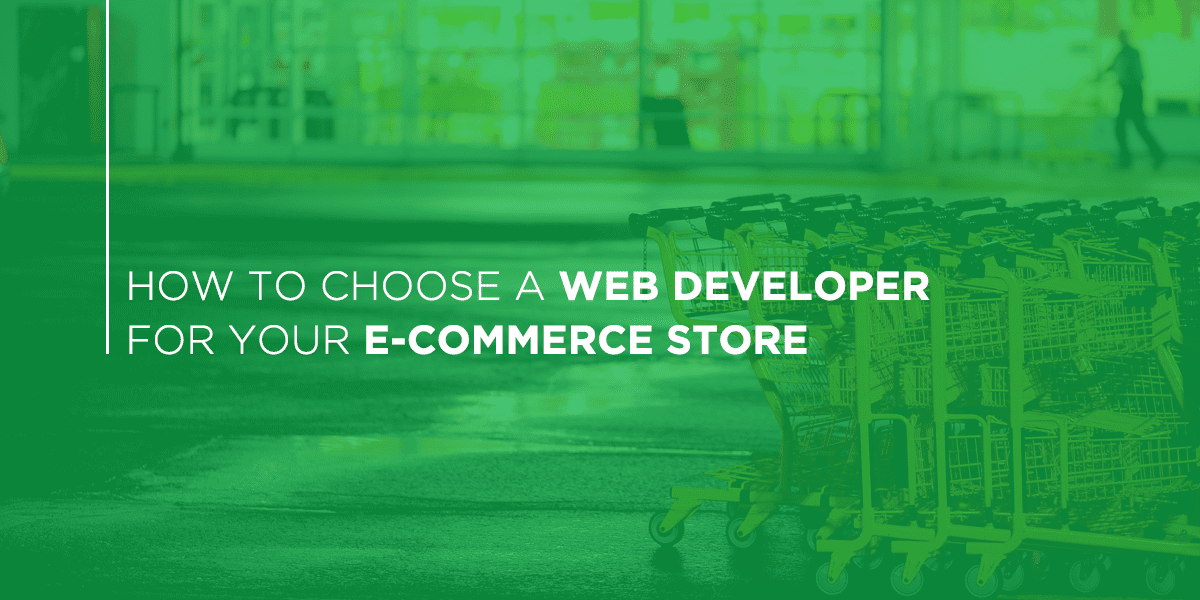Here’s how to find a qualified developer for your e-commerce website.
Over the past few years, E-commerce has become ubiquitous. Many small businesses, realizing the opportunity to reach a niche market nation-wide, have launched e-commerce stores to sell everything from products, to consulting services, to live event tickets, to digital goods. Many other businesses have used e-commerce to expand the reach of their long-standing brick-and-mortar locations.
While this has undoubtedly been a great boon for many businesses, expanding into the online marketplace has also come with many challenges, one of the most significant being the need for a functional website.
Unfortunately, many business owners don’t have the tech-savvy skills to know what they need from their website. They know that their website will have a profound impact on their business, and that makes the selection of a qualified developer a primary concern. But how can they find that developer without the technical know-how to understand what they’re talking about?
That’s a big question, but we’ll do our best to answer it. Here’s our top pointers to help you find a qualified web developer for your e-commerce business.
Avoid the RFP.
We’ve talked about this before: RFPs are a bad idea. The longer and more complex your RFP, the less likely you’ll find the developer that’s right for your business. Plus, most good developers avoid them because of their low ROI. We can only afford to invest so much time filling out an RFP if it’s unlikely to lead to business. Most of us find a lot more success following up with businesses who reach out to us because they’re interested in our services.
Furthermore, many businesses publicize their RFPs expecting web development companies to come to them. They don’t do any of their own groundwork to find qualified businesses to work with. But most successful developers are busy handling their current clients and responding to leads that have contacted them. The only ones who have time for that have a questionable amount of time on their hands.
Be proactive in finding businesses that you want to work with.
Of course, without an RFP, more of the burden of research is on your own shoulders. Try to think of this as a good thing. Instead of contenting yourself with whoever comes your way, you can start eliminating unviable candidates right from the start and focusing on the promising businesses that look like they have their act together.
Google web development studios in your area, compare their websites, and try to make sense of what they’re offering. That’s no easy feat when you’re not a developer yourself, but it will give you a better sense of the industry. When you find a studio you like and that fits your needs, contact them. Set up a meeting. You’ll learn far more about the company from personal interaction than through their response to your grueling RFP form.
Think beyond design
Web design and web development are not the same thing. Put briefly, design is the vision while development is the implementation. Designers create the esthetics; developers engineer the functionality.
A lot of businesses focus on the cosmetic appearance of the site without thinking about the mechanics. So, they focus their search on design portfolios that show off beautiful web designs, but they neglect to talk with the designer about their practical knowledge.
The result? They get a website that looks attractive but doesn’t work.
This is why web designers with backgrounds in print design often flounder. Their skillset, which allows them to create beautiful print work, does not translate perfectly to the online realm. They don’t know how to design for responsive websites, they choose fonts that aren’t web-friendly, or they make their design needlessly complicated to code. Their print work is stunning, but when it comes to websites, they don’t know what they don’t know. (This goes both ways: you wouldn’t want to hire a web designer with no experience in print to design your new business cards or mailing brochures.)
Beyond that, designers that don’t understand development are likely to make designs that impact usability and accessibility. As a result, they’ll inadvertently make design decisions that turn visitors away from your website. So: talk to your web development studio about their capabilities. Ask the designer about their experience in web development. They don’t need to be the lead developer, but they do need to be able to code.
Do they specialize in e-commerce?
There are all kinds of websites out there, from simple marketing websites to complex social media platforms, online education sites, and news outlets. Each of those comes with its own web design challenges, from custom content management systems to specialized user features.
E-commerce is no different in its unique needs. You want to work with a company that understands the security concerns behind payment processing, that can help you keep product information up-to-date, and that can work with you to lower cart abandonment.
Oh, and unlike some of those other websites we mentioned, it helps to have a development team that understands how online marketing and lead generation work. After all, your e-commerce store is supposed to sell things online. It’s icing on the cake if they can help you time your store in with automated marketing services, strong SEO, and first-hand knowledge of online advertising.
You and your web developer should be on the same team.
The long and short of this is: web development for e-commerce takes some special knowledge that you yourself might not have. But that doesn’t mean you can’t make an informed decision. The best companies will be more than happy to explain their services, answer your questions, and provide case studies from previous work to back them up.
But the bottom line is trust. Pick partners that you can work with like they’re part of your own team. Find people who are looking out not just for your best interests, but for your customers as well. That’s when your business will really take off.







